|
Biographical Log of Michael Furstner - Page 252
10 | 11 ||
2012 :
Jan |
Feb |
Mar |
Apr |
May |
Jun |
Jul |
Aug |
Sep |
Oct |
Nov |
Dec || Page :
Previous |
Next
The Martinshof Story -
A Philosophy of Happiness -
Life Awareness -
Maps, Text & Photo series
Most Recent -
Next -
Previous -
Page 1 -
Photos -
MP3s -
Maps & Text series -
Jazclass
Wednesday - Friday, July 11 - 13 2012
(diary)
My Camino walk
I am slowly starting to get my taste back for walking, but still have not gone
out much because the weather remains mostly rainy and cold. However I have
promised myself I must at least do the Löffeltal - Ravennaschlucht walk before I return to
Australia.
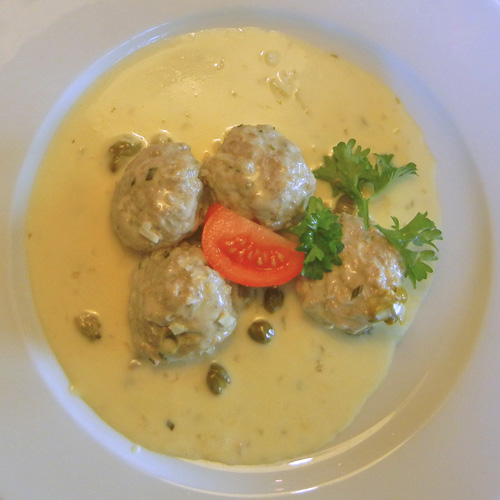 Waldcafe Special
Waldcafe Special
While at home, cosy and warm in my holiday apartment, I have marked my 6 days of Camino walks
on the route profile I
generated last year.
I also go regularly to the Wald Cafe (diagonally opposite my home) for a late lunch of
pfifferlinge and a glass
of wine, savouring the atmosphere of German folks having their "kaffee und
kuchen".
The chef/owner (Frau Christa Blattmann) also fulfilled her promise to make us Königsberger Klopse, a
dish my mother used to make (which was always much enjoyed by my University
friends when they stayed with us at Martinshof).
The meat balls, which
contain capers, are prepared by boiling them in a special light coloured sauce
and are usually served with rice, quite delicious.
Hygiene regulations in
Germany state that minced meat may not be kept in a fridge overnight in
Restaurants. Dishes like Königsberger Klopse are therefore not on the regular Menu and must be
ordered a few days before so that the chef can purchase the right amount of
meat required.
Because of the bad weather (also my TV is on the blink) I have raced through two
books of Donna Leon. I have purchased four so far but will certainly get a
few more before I go.
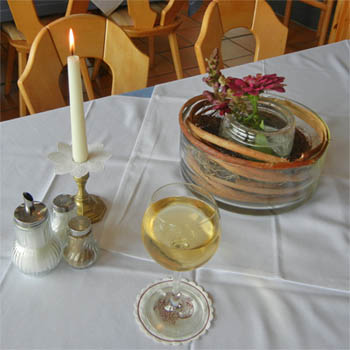 It appears to me that (perhaps starting with Georges Simenon) modern
detective series are increasingly being used as a vehicle for portraying the
environment and culture of a specific town, region or country in an interesting
way.
It appears to me that (perhaps starting with Georges Simenon) modern
detective series are increasingly being used as a vehicle for portraying the
environment and culture of a specific town, region or country in an interesting
way.
The Swiss publisher Diogenes in particular is supporting this trend by producing
German translations of detective series by a number of authors.
Besides the
three I mentioned before they also have detective series available by Petros
Markaris who, through his Kommisar Kostas Charitos, highlights the
life and environment in Greece, especially Athens.
Another author in the
Diogenes stable is Alfred Komarek, who gives insight into the wine region
of Southern Austria through the eyes of his Inspector Simon Polt.
Most Recent -
Next -
Previous -
Page 1 -
Photos -
MP3s -
Maps & Text series -
Jazclass
Saturday, July 14 2012
(diary)
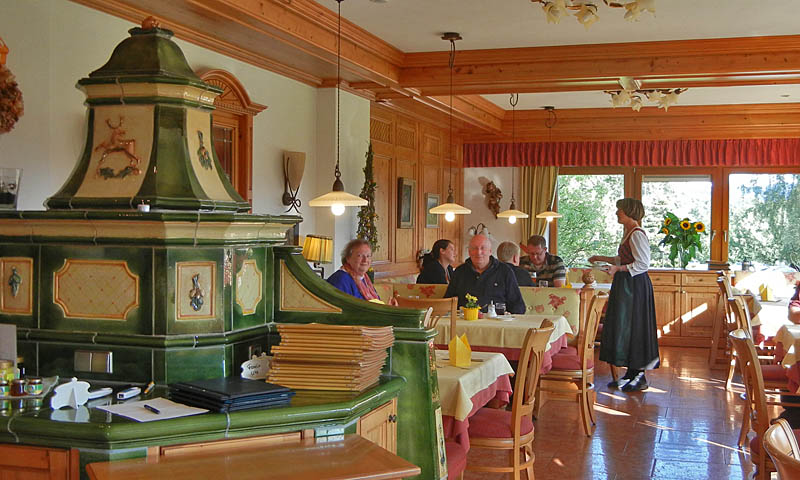 Weather forecast for Saturday is rain in the morning but clearing in the
afternoon. So I go to Freiburg (by bus and train) and indeed by the time I get there, although
still cool, the sun starts to show up between the clouds.
Weather forecast for Saturday is rain in the morning but clearing in the
afternoon. So I go to Freiburg (by bus and train) and indeed by the time I get there, although
still cool, the sun starts to show up between the clouds.
It is music week
in Freiburg and the inner city indeed is engulfed in the sounds of bands
located at various points throughout the center, Concert bands, Brass band, even
a Big Band have come out. Also several small busking groups adding their musical
contributions. It is quite nice really and the city is full of people enjoying
it all.
My mind goes back of course to very similar appearances and
performances in similar bands by myself when I was studying music in Adelaide during
the 1980s.
But I do not forget the real reason I have come to town : buying more books : and
that I do, from Rombach this time, a couple more of Donna
Leon as well
as some by the other authors I mentioned, Alfred Komarek and Petros
Markaris. I am becoming a real addict I believe, every time I walk into a
bookshop here in Freiburg I can't stop buying more books. Ah well, it will end soon when I get
back to Darwin.
Saturday evening Wivica and I have dinner in the Jägerhaus, another Restaurant we favour
in Sankt Peter. Wherever you go in Southern Germany the restaurants are
delightfully decorated and the Jägerhaus is an excellent example of it. I have
another favourite of mine here in the Black Forest : Reh ragout mit
Preisselbeeren, very good indeed.
Most Recent -
Next -
Previous -
Page 1 -
Photos -
MP3s -
Maps & Text series -
Jazclass
Sunday - Wednesday, July 15 - 18 2012
(diary)
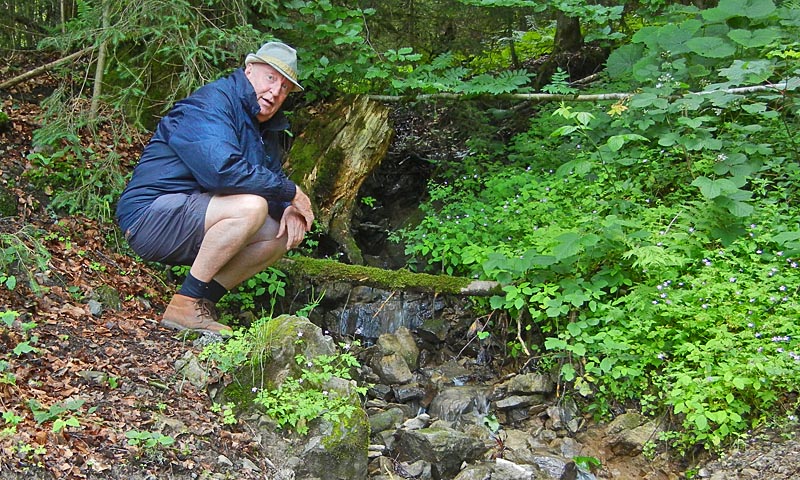 Monday was dry and passable weather so I did the Bärental - Titisee walk (6.5 km), Tuesday to Freiburg
(buying 3 more books) and Wednesday the weather was finally something
like summer so I went out and did the magnificent Löffeltal - Ravennaschlucht walk (8 km).
Monday was dry and passable weather so I did the Bärental - Titisee walk (6.5 km), Tuesday to Freiburg
(buying 3 more books) and Wednesday the weather was finally something
like summer so I went out and did the magnificent Löffeltal - Ravennaschlucht walk (8 km).
I feel
really, really good about this because it means that my physical condition is
around where it was 2 years ago. So I have recovered from my dreadfully poor
condition I was in when I arrived here in Europe two months ago.
Here you see me crouching next to a tiny spring, crossing the Bärental -
Titisee walking track, in the middle of a dark (largely) pine forest. I believe
there is no doubt that water, not gold, is the most magical substance in
our lives.
We gravitate towards water whenever we can, be it an ocean beach,
a river or even a tiny spring like this. Not surprising perhaps, after all our
bodies consist for 90% out of water.
Back in Holland my friend Dick Matthes showed me several books about my native region,
including a book about the river IJssel* : just 10 photographs and 10
accompanying poems about this river.
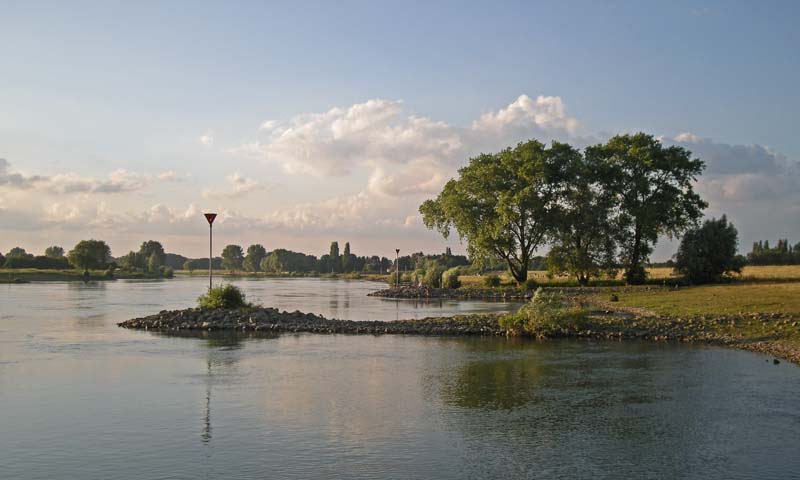 One poem was by Liselore Gerritsen, a contemporary of me at High school and
also (I believe) at University. Later she became a popular Dutch singer and
entertainer.
One poem was by Liselore Gerritsen, a contemporary of me at High school and
also (I believe) at University. Later she became a popular Dutch singer and
entertainer.
The essence of her poem was that we all had a river in our
"soul" (so to speak) and that hers was the IJssel.
With the proviso that people in dry areas without a river
may not have such personal, emotional or spiritual
(take your choice) connection, in water rich countries like Holland I believe she is 100%
correct. (For most Australians it would be the ocean, rather than a river, which runs through their soul.)
I too feel a very close connection to the river IJssel. In fact
my very first memory as a 2-3 year old baby was connected to it. Lying in my
parents' bed one morning I heard a huge bang : Dutch demolition experts had blown
up the bridge across the IJssel in Zutphen (in 1939) to prevent the German
army from advancing into our country. A futile effort as it worked out, and a
real inconvenience for several years after the war, before a new bridge was
built.
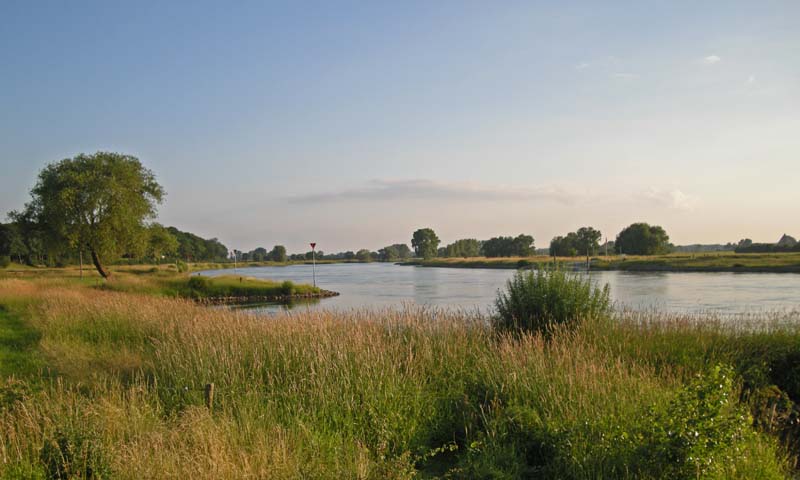 Later, as a young boy and teenager I learned to swim in the IJssel (in Gorssel)
and with my mother we often hired a rowing boat (wooden dinghy) and row upstream
up to a beach somewhere along the river, then afterwards rowed into the middle of
the IJssel and drifted back to the mooring point at Cafe "De Houtwal".
Later, as a young boy and teenager I learned to swim in the IJssel (in Gorssel)
and with my mother we often hired a rowing boat (wooden dinghy) and row upstream
up to a beach somewhere along the river, then afterwards rowed into the middle of
the IJssel and drifted back to the mooring point at Cafe "De Houtwal".
I also swam across the (80m wide) river several times and even walked on it
when partly frozen during a very cold winter (in 1946 or 1947 ?), a very
foolish thing to do.
Many years later (1981-82), when I was in charge of
our family business Martinshof I used to drive to the Houtwal and watch the
IJssel water flow by to regain peace of mind and confidence during those
difficult years when I attempted and indeed managed to save the company.
Therefore, although I only rarely see the river these days (we did have our
Martinshof reunion this years in a restaurant overlooking the IJssel), this
river is still in my blood, will always remain there and be an essential part
of my very being. (So Liselore, as far as I am concerned you are spot on!)
*
The IJssel branches off from the Rhine at Arnhem. It flows NE, then N and eventually in what used to be the IJsselmeer (IJssel lake), which is now largely reclaimed land.
Most Recent -
Next -
Previous -
Page 1 -
Photos -
MP3s -
Maps & Text series -
Jazclass
Thursday - Saturday, July 19 - 21 2012
(diary)
After that sunny Wednesday it was too much to hope for some more good weather,
and of course it was overcast, cool with intermitted rain for the remainder
of this week.
I concentrated therefore on going through all my Camino walk photos and processing the ones I liked. So all
in all I have now 64 photographs online from that venture.
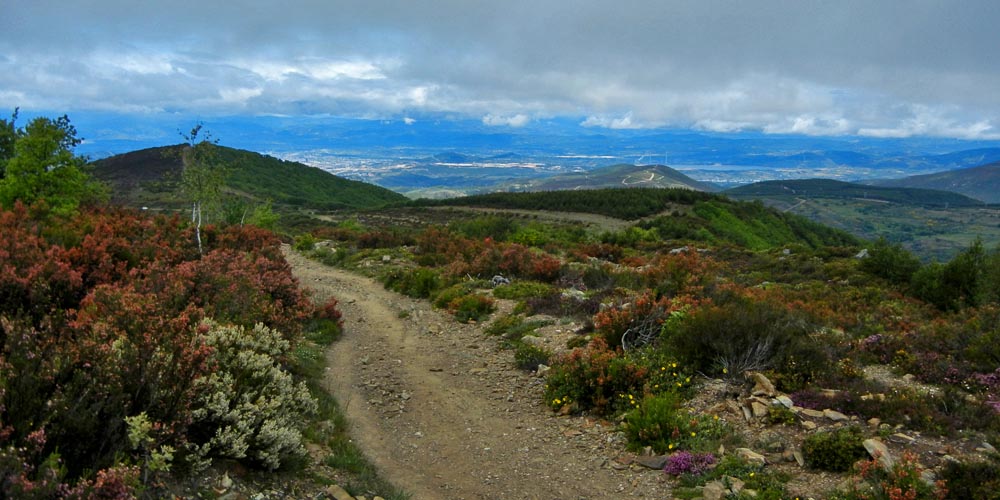
The series now shows clearly the two distinctively different landscapes : low
bushes with a variety of colourful heathers and only few trees during the first two days
while traveling through the province of Leon, then, shortly after entering the province
of Galicia, more gently undulating
rural landscapes, with farm areas and woods.
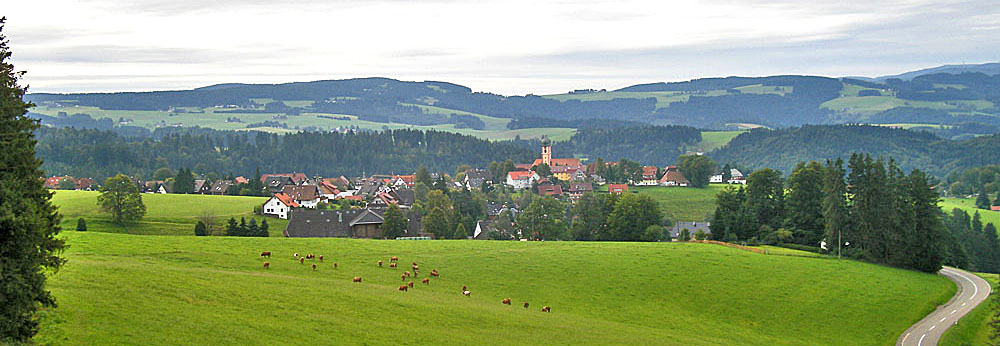
It is also interesting to note the enormous contrast between the largely wild
natural landscapes of my Camino route, with the manicured, hand made landscape
of the Black Forest.
During the Middle Ages all the existing forests of the Black Forests had been
completely cut down for the purpose of building, heating and glass blowing.
Trees (predominantly pines) were later replanted, but after some 800 years the
human design is still clearly prominent.
Another great difference I noticed between my walks on the Camino and through
the Black Forest is water. An abundance of water (springs, creeks small
rivers, lakes) throughout the Black Forest is a stark contrast to the almost
total absence of it in NW Spain - just a few tiny trickles, not even warranting
the name "creek", in Galicia. This difference sets entirely different moods
while walking through these landscapes.
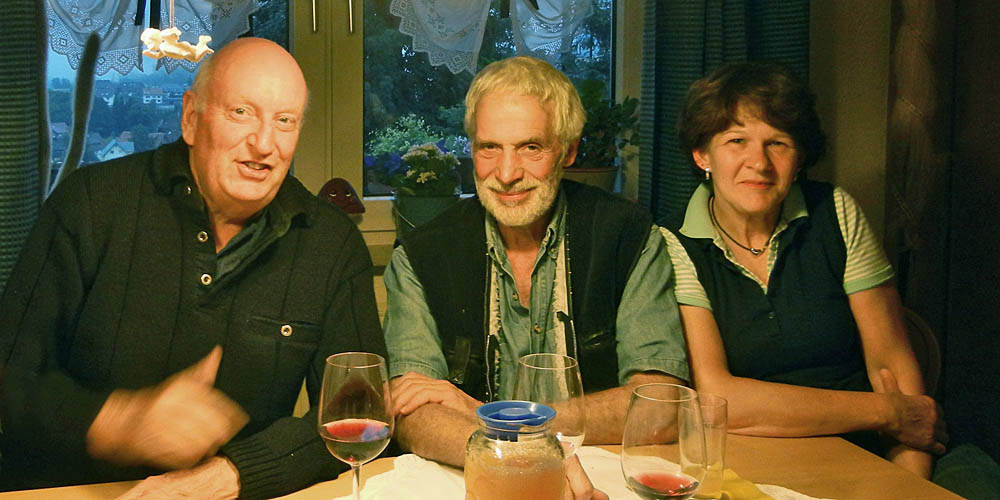 I am having my final few days here in Sankt Peter and am saying farewell to a
few acquaintances I made. Friday a pleasant evening with Georg and Lydia Blattmann, the owners of Steingrubenhof where I have been staying.
I am having my final few days here in Sankt Peter and am saying farewell to a
few acquaintances I made. Friday a pleasant evening with Georg and Lydia Blattmann, the owners of Steingrubenhof where I have been staying.
Lydia is planning to visit her two daughters (one living in NZ, the
other in Brisbane) in January-February next year, and she is very much looking
forward to that.
Tonight (Saturday) Wivica will join me for my final dinner at the Waldcafe, where I will most likely enjoy
my last Ochsenzunge for a while.
Comments -
Most Recent -
Next Page -
Previous -
Top -
Photos -
MP3s -
Maps, Text & Photo series -
Jazclass
© 2012 Michael Furstner
|








